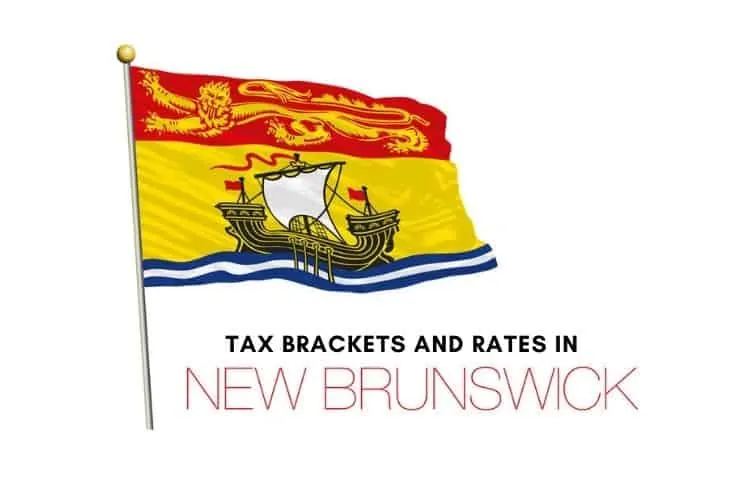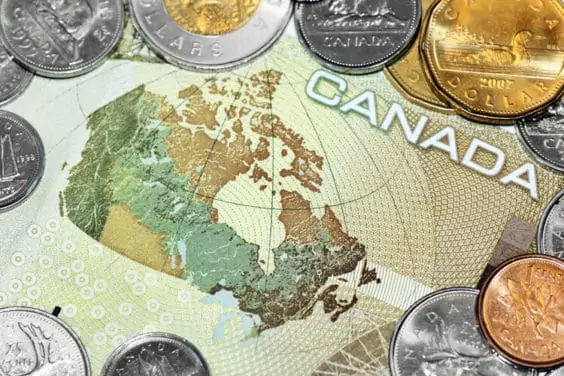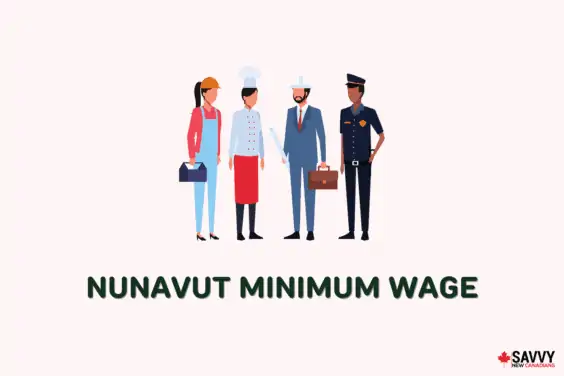Like other provinces and territories in Canada, New Brunswick has a progressive tax system and tax rates that increase as your taxable income increases.
The lowest tax rate in the province is 9.40% and the top rate is 20.30%.
When combined with federal taxes, New Brunswickers pay a tax rate ranging from 15% to 53.30% on ordinary income.
Tax brackets in New Brunswick are indexed to the Federal inflation rate. The rate used for indexing the 2022 tax brackets is 2.4% (or a 1.024 indexation factor).
The minimum wage in New Brunswick is $12.75 per hour.
You can learn more about the tax brackets in other provinces using the links below:

New Brunswick Tax Brackets 2022
New Brunswick’s personal income tax rates and brackets in the 2022 tax year are:
| 2020 Taxable Income | New Brunswick Tax |
|---|---|
| Up to $44,887 | 9.40% |
| $44,887.01 to $89,775 | 14.82% |
| $89,775.01 to $145,955 | 16.52% |
| $145,955.01 to $166,280 | 17.84% |
| $166,280.01 and over | 20.30% |
In order to calculate your taxes, you pay:
- 9.40% on the first $44,887 of taxable income, plus
- 14.82% on the next $44,888 (i.e. on the portion of taxable income over $44,887 up to $89,775), plus
- 16.52% on the next $59,152 (i.e. on the portion of taxable income over $89,775 up to $145,955), plus
- 17.84% on the next $20,325 (i.e. on the portion of taxable income over $145,955 up to $166,280), plus
- 20.30% on income exceeding $166,280
New Brunswick’s basic personal amount in 2022 is $10,817. If your taxable income for the tax year is below this amount, you will not owe provincial income tax.
New Brunswick Income Tax Calculation
Your provincial marginal tax rate is the amount of tax you pay on an additional dollar of income. It is different from your average tax rate.
Assuming your taxable income in 2022 is $90,000, your provincial marginal and average tax rates are as follows:
| Tax Bracket | Marginal Tax Rate | Taxable Income | Tax Paid |
| $0 – $44,887 | 9.40% | $44,887 | $4,219.38 |
| $44,888 – $89,775 | 14.82% | $44,888 | $6,652.40 |
| $89,776 – $90,000 | 16.52% | $225 | $37.17 |
| Total | $90,000 | $10,908.95 |
Based on the table above, your provincial marginal tax rate is 16.52% and this is the rate you would pay on an extra dollar of ordinary income.
Your average tax rate is lower at 12.12%; calculated as $10,908.95 ÷ $90,000.
Related: Tax Return Software in Canada.
New Brunswick Marginal Tax Rates (Federal and Provincial)
The federal tax rates and brackets in 2022 are:
| Taxable Income | Federal Tax Rate |
| Up to $50,197 | 15% |
| $50,197.01 to $100,392 | 20.50% |
| $100,392.01 to $155,625 | 26% |
| $155,625.01 to $221,708 | 29% |
| $221,708.01 and over | 33% |
When provincial and federal taxes are combined, your tax rates for different sources of income are:
| Taxable Income | Ordinary Income | Capital Gains | Eligible Canadian Dividends | Ineligible Canadian Dividends |
| Up to $44,887 | 24.40% | 12.20% | -6.38% | 14.52% |
| $44,888 to $50,197 | 29.82% | 14.91% | 1.10% | 20.75% |
| $50,198 to $89,775 | 35.32% | 17.66% | 8.69% | 27.08% |
| $89,776 to $100,392 | 37.02% | 18.51% | 11.04% | 29.04% |
| $100,393 to $145,955 | 42.52% | 21.26% | 18.63% | 35.36% |
| $145,956 to $155,625 | 43.84% | 21.92% | 20.45% | 36.88% |
| $155,626 to $166,280 | 47.22% | 23.61% | 25.12% | 40.77% |
| $166,281 to $221,708 | 49.68% | 24.84% | 28.51% | 43.60% |
| $221,709 and over | 53.30% | 26.65% | 33.50% | 47.76% |
The top combined federal and provincial tax rates payable in New Brunswick are:
- Ordinary income: 53.30%
- Capital gains: 26.65%
- Eligible Canadian dividends: 33.50%
- Ineligible Canadian dividends: 47.76%
Ordinary income includes income earned as wages, commissions, rent, royalties, pensions, and income from bonds and savings accounts.
Capital gains are taxed differently and only 50% of capital gain is included in your taxable income.
Dividends are categorized as eligible and ineligible dividends.
Eligible dividends enjoy preferential tax treatment and are grossed up by 38%. You can also claim a dividend tax credit.
The gross-up rate and dividend tax credit are lower for ineligible dividends.
Related: How To Invest in Canada.
New Brunswick Tax Credits and Deductions
Tax credits reduce the taxes you owe and may result in a refund. On the federal level, you may be eligible for the following tax credits:
- Basic personal amount
- Age amount
- Spouse or common-law partner amount
- Canada caregiver amount
- CPP contributions
- Employment insurance premiums
- Homebuyers’ amount
- Pension income amount
- Disability amount
- Medical expenses
- Donations and gifts
You can find a complete list of tax credits here.
Tax deductions lower your taxable income and include your RRSP contributions.
Tax credits specific to New Brunswick (NB) include:
- NB Low-Income Tax Reduction
- NB Political Contribution Tax Credit
- NB Small Business Investor Tax Credit
- NB Seniors’ Home Renovation Tax Credit
- NB Labour-Sponsored Venture Capital Fund Tax Credit
New Brunswick Sales Tax
New Brunswick uses the Harmonized Sale Tax regime, similar to Nova Scotia, Ontario, Newfoundland and Labrador, and Prince Edward Island.
The HST rate in New Brunswick is 15%. The provincial portion is 10% and the federal portion is 5%.
HST rebates are available on printed books, audio recordings, scriptures, some vehicles, and research and development by a university.
Related: Tax Filing Deadline in Canada.
How To File Your Tax Return in New Brunswick
You can easily file your taxes online using a CRA-approved tax software.
These tax preparation programs use the NETFILE system to securely transmit your data to the CRA. Examples include WealthsimpleTax and TurboTax.
For the 2021 tax year, the deadline to file your taxes is on May 2, 2022.
Self-employed individuals and sole proprietors get an extension until June 15.
Frequently Asked Questions
The New Brunswick Low-Income Tax Reduction tax credit applies in full when your income is $17,840 or lower in 2021 for a single person.
The personal income tax rate for New Brunswickers is from 9.40% to 20.3%.
The minimum wage in the province is $12.75 per hour. It is updated on April 1st of each year.
Have questions about the tax rates and brackets in New Brunswick? Leave them in the comments.



